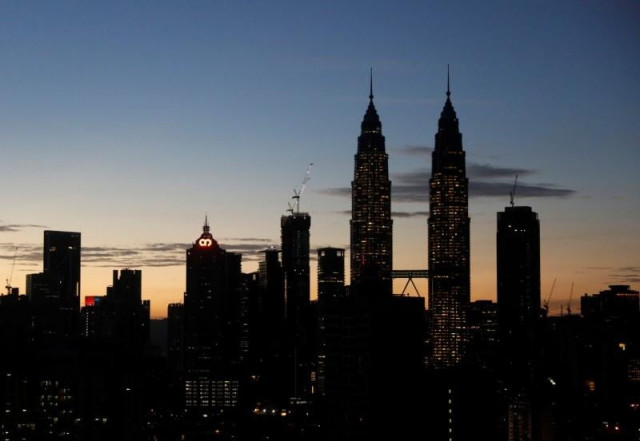What can Malaysia offer Pakistan?
Pakistan PM can learn from the visit how Malaysia has progressed

A view of Kuala Lumpur skyline in Malaysia February 16, 2017. PHOTO: REUTERS
Imran became prime minister after 22 years of political struggle. Mahathir has become prime minister, after serving as the premier for 22 years. Hence, Imran is on the right path – he must visit Malaysia for the reason of learning something from Mahathir.
Soon after the visit was announced, I received a call from a good friend who urged me to suggest ways how Malaysia could assist Pakistan. Malaysia is now in a democratic transition – from 61 years of kleptocracy, of which Mahathir himself has been part of – to a new form of coalition-led government with wider public support.
Malaysia is also in economic transition, where everyone has realised that the old economic logic will work no more but no one is sure what the new economic logic is. Malaysia’s old economic logic is characterised by a dual economic model – in one economy, the state is heavily dependent on ethnic-based policies and has thousands of inefficient state-owned enterprises; in the second economy, private sector, competitiveness and globalisation thrive.
I hope that Imran and his economic team will inquire about this second economy, and not the first economy, which has become a big drag on Malaysia’s growth.
Malaysia is included in the top-25 economies of the world in terms of competitiveness and ease of doing business. With Pakistan’s current rank below 125, obviously, there is a long journey ahead for Pakistan, but let’s not forget that the country was decently placed at 70th position in 2002.
Malaysia is run by a very strong central government where the states have a negligible share in resources and power arrangement. On the other hand, Pakistan’s federation is stronger as provinces share more than half of national fiscal resources.
A strong central government and a relatively slim population of 31 million has helped Malaysia in making headway as an Asian tiger.
Civil service
Both Malaysia and Pakistan inherited the same erstwhile British civil service. However, we have done rounds of experimentation with our civil service, weakening them, subjecting them to political intervention and exposing them to perks and privileges. In Malaysia, the civil service, though not above criticism, exhibits several pockets of excellence.
One example is its Ministry of International Trade and Investment (MITI) - its bureaucratic linchpin behind economic growth, industrialisation and foreign direct investment-led exports.
Before Mahathir became prime minister in 1981, he was the minister of trade and investment in the 1970s, where he played a key role in Malaysian economic miracle. He worked with the bureaucrats like a well-knitted team, which created a healthy equation between politicians and bureaucrats.
Once you join MITI, an officer could not be posted or transferred outside the ministry. Over time, these officers gain a high degree of knowledge about trade and investment which helps the private sector understand and enter world’s markets. As Nadeemul Haque argues consistently, there cannot be a good market without a good government first. Imran should ask Mahathir how can a MITI-like structure be created in Pakistan?
High Commission
When Imran will visit Kuala Lumpur, he will probably be taken to two exquisite colonial-era buildings in the heart of the city by very professional and courteous staff of Pakistan’s High Commission.
One is Pakistan High Commission, which is situated right next to a five-star hotel and within a few yards of the Petronas Twin Tower. The other is high commissioner’s residence, called Pakistan House, another exquisite colonial-era structure, with the future Kuala Lumpur signpost, TRX Tower on its back.
Both buildings feature sprawling lawns, a very unusual scene in the heart of a global metropolis. However, Imran should understand that these two buildings are like dead capital. They are probably worth hundreds of millions of dollars if properly utilised.
The government of Pakistan should sell these properties and issue tenders for a joint project to build a mixed zone property, earning rent and offering better facilities to both staff and Pakistani diaspora.
Imran should request Mahathir to aid Pakistan’s government in selling these precious properties to competitive bidders or to develop joint projects and let Islamabad earn some revenue. Some years ago, Britain did the same. The British embassy was located on the same road, a few yards ahead of Pakistan High Commission. However, the nation realised that it was a scandalous wastage of precious land resource and offered it for sale in 2013.
It was sold for around $100 million and the winning developer launched a property project three times over. Why we can’t do the same?
Let’s hope that when Imran comes to Malaysia, he and his team ask Dr M the right questions about how Malaysia has progressed and not how it prosecutes a former prime minister.
The writer is the founder of PRIME Institute, an Islamabad based think tank, and is currently working as the CEO of IDEAS, an independent think tank in Malaysia
Published in The Express Tribune, November 5th, 2018.
Like Business on Facebook, follow @TribuneBiz on Twitter to stay informed and join in the conversation.



















COMMENTS
Comments are moderated and generally will be posted if they are on-topic and not abusive.
For more information, please see our Comments FAQ